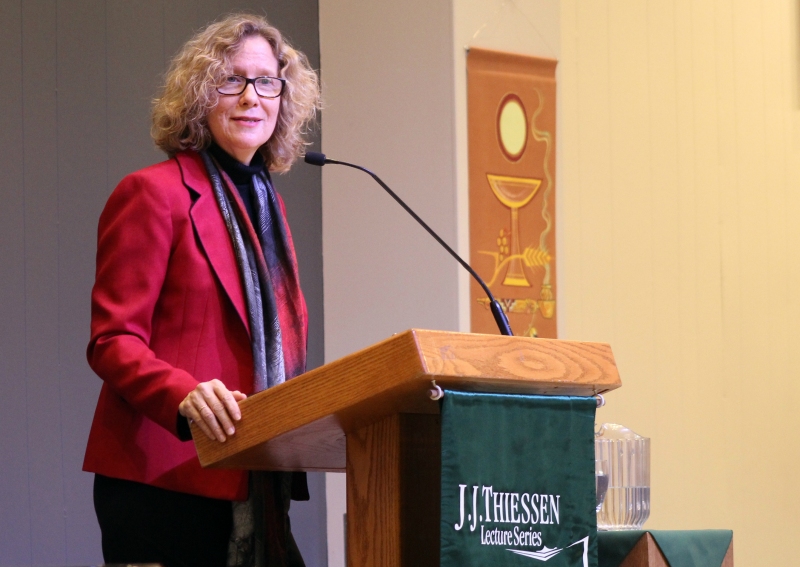
2019 J.J. Thiessen Lectures with Dr. Nancy Elizabeth Bedford (videos)

Christology Revisited: Why Jesus Matters
With Dr. Nancy Elizabeth Bedford, Georgia Harkness Professor of Theology at Garrett-Evangelical Theological Seminary in Evanston, IL
Why does it still matter to think about and to talk about Jesus Christ, as the theological discipline of "Christology" seeks to do? This lecture series will explore some of the material implications for our life together of the ways Jesus is envisioned in our contexts. Christology matters in concrete ways both for followers of Jesus and for non-Christians who are affected by the convictions and actions of those who claim a Christian identity.
Lecture #1: Tuesday, October 22 | The Problem of a Ghostly Jesus: The Social and Political Implications of Docetism
"Docetism" refers to an ancient distortion about the person of Jesus, according to which Jesus only seems to be (from the Greek root dokeo) fully human. It often originates in the desire to stress the work of Jesus on behalf of God and indeed as God. However, whenever Jesus is posited as less-than-human, he becomes a ghostly figure that is easier to manipulate for social and political ends that have little to do with his message and his life as presented in the gospels. In North America, he has often become a symbol for white supremacy and the superiority of elite males. We will explore whether an anti-docetic approach that values the true humanity of Jesus can push back against the co-optation of Christology by those who very likely would have despised him, had they met him in the flesh.
Lecture #2: Wednesday, October 23 | Mary Matters: Re-thinking the Theological Place of Jesus' Fierce Mother
One way to ground the true humanity of Jesus is to pay closer attention to his mother and how the theological discipline of "Mariology" can be helpful in revisiting Christology. In thinking about Mary we are faced with a paradox: On the one hand, she is the guarantee of Jesus' true and full humanity as our Brother, as Paul indicates when he points out that Jesus was "born of a woman, born under the law" (Gal. 4:4). On the other hand, the theological tradition soon seems to paint her as less than human herself, imagining her "immaculate conception" and a way of giving birth to her son preserved her "ever-virgin" state. We will explore how the ways Mary was understood and depicted by Julian of Norwich (1342-ca. 1416) and Sor Juana Inés de la Cruz (1648-1695) can help us express how and why "Mary matters."
Lecture #3: Wednesday, October 23 | Why Christology is Not Enough: The Spirit and the Pathways Opened Up by Jesus
In the beautiful English of the King James Version and in many old hymns, the Holy Spirit is called the Holy "Ghost," a word that hearkens back to a Germanic root (g?st, as also in modern German Geist), rather than a Latin one (Spiritus). To speak of the Holy "Ghost," however, takes many of us right back to the same kind of docetic and "ghostly" theology we have been trying to avoid as we think about why Jesus "matters." How then, can the Holy Spirit make a positive difference for Christology? In exploring John 14-17 we will find that is precisely the Spirit who can move Christology from a "ghostly" and docetic endeavor to a grounded, dynamic way of living and thinking in the world as followers of Jesus.
Printed from: media.cmu.ca/2019jjtlecturevideos